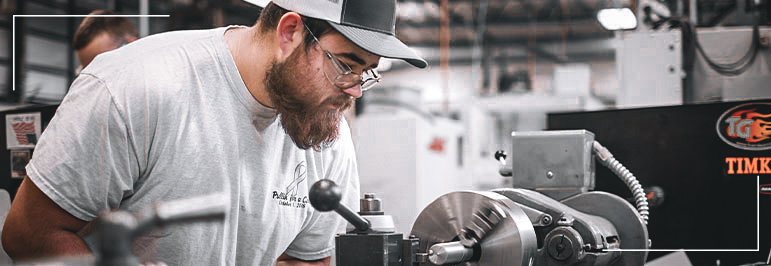Machining

Machining - Certificate - Quality Assurance
If you’d like a high-paying career upon graduating from BTC, then you should consider Precision Machining. You’ll be prepared to work right away as a machinist; with experience you can advance to positions such as journey level machinist, tool programmer, CNC operator/programmer or engineer.
You’ll learn how to use machine tools such as lathes, drill presses, and milling machines, plus blueprint reading, basic CNC programming and machine processes. Employers who hire graduates from the Precision Machining program include aircraft, boat, and automobile manufacturers, industrial machinery firms, and machine shops.
Employment Information
Data are provided on a program (not credential) level
75% BTC graduate placement rate1
$61,832 starting annual wage2
$88,103 average annual wage2
$99,158 potential annual wage2
Entry Information
When Can I Start?
This is not a stand-alone certificate, students must meet all program level entry requirements.
What are the Minimum Entry Requirements?
A completed college admissions application and placement in English and math. BTC uses a Guided Self-Placement process to help you choose the best starting point for your English and math courses. Your selections will determine whether you begin with program coursework or complete prerequisites classes first.
To get started or for help determining your English and math placement, contact the Outreach department at Outreach@btc.edu.
What are My Next Steps?
Classes
Total Program Credits: 19
Students may be able to complete this certificate in 3 quarters. Required Courses for Program
QA 110 Introduction to Quality Assurance for Machining 3 CR QA 115 Intermediate Quality Assurance for Machining 3 CR QA 120 Advanced Quality Assurance for Machining 3 CR AENGL 100 Applied English 5 CR AMATH 100 Applied Occupational Math 5 CR
Program Outcomes
After successfully completing the Quality Assurance certificate, students will be able to:
- Read and interpret blueprints per industry standards with an emphasis on GD&T.
- Validate parts using measuring equipments like calipers, micrometers, bore gages, electronic height gages, and CMMs.
Employment Outlook
Employment of machinists is expected to increase and employment of CNC operators is expected to increase.
Criminal convictions may restrict or prevent student participation with internships and employment in this industry.
Although most program graduates work as machinists, with experience, graduates can advance to positions such as journey level machinist, tool programmer, CNC operator/programmer, manager, engineer and machine and shop tools sales and service representative.
In addition, some graduates are self-employed. Around the country, most machinists work in small machining shops or in manufacturing firms that produce durable goods, such as metalworking and industrial machinery, aircraft, or motor vehicles.
Faculty & Support

Jacen Johnson
Machining
Jeffrey Halfacre
MachiningContacts
If you have questions about this program or want help with the admissions steps to Bellingham Technical College, please email outreach@btc.edu.
Current students wanting academic planning and support, can connect with the program Instructor(s) or email AdvancedManufacturingNav@btc.edu
